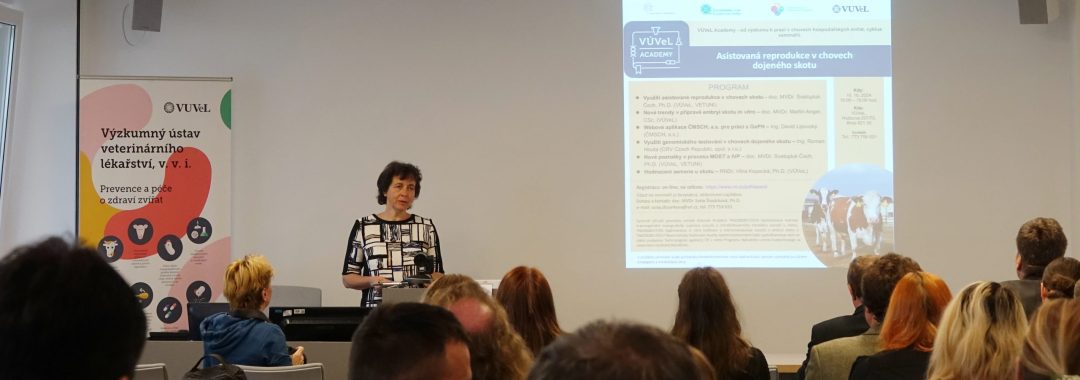series. It focused on the use of all currently available methods of assisted reproduction in dairy cattle herds. The lectures were delivered by experts from the VRI, the University of Veterinary Sciences Brno (VETUNI), as well as from the CRV Czech Republic, spol. s r.o., and the Czech-Moravian Breeders’ Corporation, Inc. (CMBC, Inc.).
In addition to the now used standard methods of stimulation and induction of oestrus and ovulation, as well as oestrus synchronization, embryo transfer procedures are on the rise, specifically the MOET (multiple ovulation and embryo transfer) and IVP (in vitro embryo production) methods. From approximately 580,000 transfers in 2021, there was an increase to 1,350,000 in 2022, primarily due to an increase in IVP. The attendees were also informed about the current procedures for preparing insemination doses, from semen collection to the freezing process, and it was emphasized that there is a high degree of standardization in this process at artificial insemination stations, while on the other hand, there is still a considerable variability in the handling process of the insemination dose directly during the insemination event. Attention was also given to semen sexing, a service that can now be provided by CMBC, Inc. The breeders were introduced to the web applications of CMBC, Inc. for working with genomic breeding values, which can significantly accelerate the achievement of their breeding goals, specifically Cloud DNA. In the Czech Republic, there are projects such as Fit Cow and Cattle Genom, which support genotyping. Thanks to these projects, approximately 30% of heifers are genotyped annually in the Czech Republic.
The presentation given by RNDr. Věra Kopecká, Ph.D. (VRI) addressed the evaluation of bovine semen. In bull ejaculate, the concentration, motility, viability (percentage of live sperm), and sperm morphology are commonly evaluated. As additional parameters, tail plasmalemma integrity, acrosomal integrity, and mitochondrial function activity may be assessed, and also, for example, genetic disorders of sperm are determined.
The seminar presented the findings obtained under the project TN02000017/018, Optimisation of transvaginal sonographic oocyte aspiration and intrafollicular oocyte transfer in cattle; TN02000017/03, Optimisation of in vitro culture and micromanipulation of bovine oocytes; and TN02000017/017, Novel methods for the evaluation of semen quality in breeding bulls, co-financed by the state support of the Technology Agency of the Czech Republic within the Programme of the National Centre of Biotechnology in Veterinary Medicine, NaCeBiVet.


